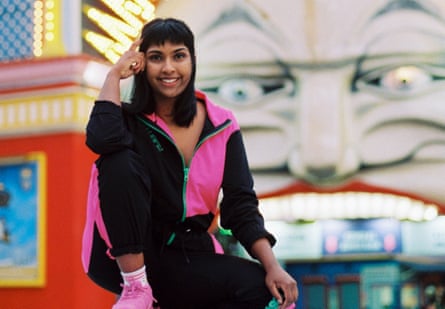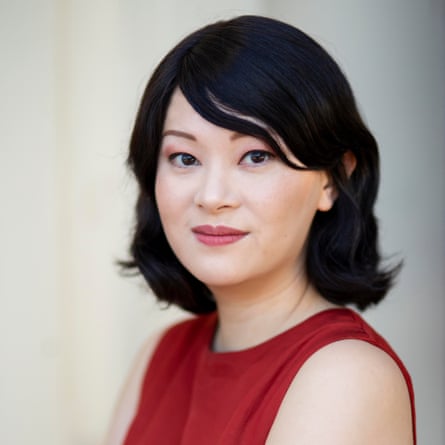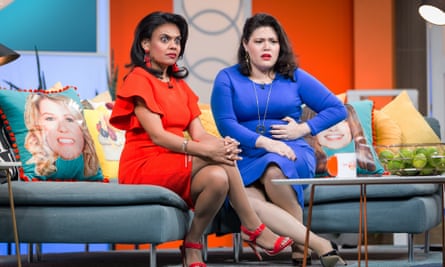The Australian screen industry is experiencing a moment of reckoning. In the last two weeks, multicultural affairs minister Alan Tudge has come under fire for suggesting that the diversity on a cooking show was proof that Australia was racially harmonious; Sunrise host Samantha Armytage and commentator Prue MacSween have been sued over allegedly racist on-air comments; and, after attracting a fair amount of outrage, Sunday’s ABC Insiders panel featured its first person of colour since at least 2005.
It’s not a new conversation, but it has flared anew in past weeks – one of many cultural spotfires sparked by the Black Lives Matter movement, and global protests against police brutality and systemic racism.
Last week Netflix deleted from its library four Chris Lilley shows in which the white comedian acts in black- or brownface; and this week, Please Like Me creator Josh Thomas tweeted a public apology, after a clip from a 2017 panel began circulating in which he argued that casting diversity was easier in the States because “finding an experienced actor that’s not white is really hard” in Australia.
We spoke to six Indigenous people and people of colour who work behind and in front of the camera about what’s going wrong in Australian TV – and what needs to change.
‘The talent exists. Be less lazy’: Benjamin Law, screenwriter and commentator
On The Family Law, the team demonstrated that when gatekeepers make the excuse, “Oh, there aren’t enough actors of a certain background” – that’s bullshit. You just haven’t made the effort to find them. Yes, it’s harder than just calling up the same Caucasian faces that you already know. Taking the time is the only way you’re going to do it. In news and current affairs, it took many people outside and within the ABC lobbying Insiders to produce a result. Part of me wants to be grateful to those gatekeepers for that change, but there’s part of me that feels resentful they’re not doing the work they’re literally paid to do: find the talent.
Agree it's time @InsidersABC had Indigenous panellists—eg.
— Benjamin Law 羅旭能 (@mrbenjaminlaw) June 9, 2020
• @StanGrantMOF fmr ABC Global/Indigenous Affairs Analyst
• @NITV political correspondent @Shahni_W
• @NITV reporter @nakarithorpe
• @amymcquire x @SatPaper's cover story
How about it @David_Speers @sclark_melbs? https://t.co/dUOR4BNNlg
People of colour and Indigenous people often come out of writers’ rooms feeling quite used, especially when they don’t stay on the team in any significant way. When it’s an all-white team calling the shots, it can feel like they are harvesting minority stories and minority pain – “Tell us your experiences – your trauma especially”. Yes, you might be given a credit, but even that’s a mixed blessing: the show could change significantly from when you were involved and then suddenly you’re being used as a shield to back up every creative decision, even potentially problematic ones.
There’s no reason for any power structure to be comprised of a single gender or cultural background. No one in Australia wants that for their workplaces or their institutions. But if we were to actually apply that, it would mean different-looking teams and boards across all Australian networks – including SBS’s leadership team, and the ABC executive and ABC board. It takes a generation to be able to take the next generation with them. But in the meantime, gatekeepers need to work harder to stop excluding so many.
I talk about so much of this from a sense of cultural and social responsibility but an economic case can be made too. Most of the diversity on commercial television is in the commercials themselves. Advertisers clearly realise that there is money to be made by representing the community; why don’t the production teams? In one of the most multicultural nations on the planet, it just seems financially bizarre that you wouldn’t see this as a growth opportunity.
‘Disrupt, agitate, educate and be brave’: Natesha Somasundaram, screenwriter
Last week I penned a pretty brutally honest open letter to the industry. Don’t get me wrong, I love being a writer! But I also adamantly want our storytelling institutions to be held to a higher standard.
This article includes content provided by Instagram. We ask for your permission before anything is loaded, as they may be using cookies and other technologies. To view this content, click 'Allow and continue'.
I want my screen industry to disrupt, agitate, entertain, educate – and be brave enough to completely restructure their practices for a rapidly restructuring world. I’m speaking out against this industry’s obsession with the optics of skin colour, rather than taking the time to understand the complex, nuanced ways in which race can inform an individual’s lived experience. I want this industry to stop thinking in mindless, condescending, aesthetically-pleasing “diversity initiatives”, and start thinking critically about how to engage with black and brown creatives like actual human beings.
I want an industry that actually understands that the world will never be completely void of injustice and inequality – so likewise, it will never stop striving to do better too. I want an industry that is discerning enough to stop overlooking talented, ambitious and rigorous black and brown artists in favour of unambitious, untalented and unrigorous “senior” artists. I want an industry that understands meaningful change will actually require a complete reboot in cognition, and we’ll all be better for it. As the old adage goes, “clean your own house first”. (And as my old adage goes, “I’m really a nice person, even though I swear a lot. Sorry mum.”)

‘Non-Indigenous creatives are stealing the marketplace’: Penny Smallacombe, head of Indigenous at Screen Australia
Since its inception in 1993, the core focus of Screen Australia’s Indigenous department has been to support Indigenous perspectives and stories. Our industry has made huge progress, but it is a culmination of nearly three decades of work – and we still have a long way to go.
There are some really fantastic companies doing the right thing, but some others are more focused on riding the wave to profit from an Indigenous story – which is often a story of tragedy. A non-Indigenous creative reads a book about a massacre, and they’re so moved they feel a need to tell the story now, but they end up stealing the marketplace from Indigenous filmmakers. It’s very hard for an Indigenous person to get a story up about an issue once it’s been told from a non-Indigenous point of view. It’s vital that filmmakers ask themselves, am I the best person to tell this story? Can I tell this story authentically? It’s actually not a god-given right to tell someone else’s story.
That’s my biggest frustration. I love my job, but more and more of my time is now taken up by reading scripts by non-Indigenous people and feeding back notes. Indigenous creatives don’t want to consult on those projects anymore, either. And non-Indigenous people of colour are playing even more catch-up: they’re now going through what we went through 10 years ago.
Non-Indigenous producers and production companies have to ensure that their writers’ rooms are safe. The expectation that you bring someone less experienced into a room filled by white people who have been in the industry for 20-30 years, and that they will be ready to write an hour of TV drama overnight without nurturing and mentoring, is ridiculous. It can be a shock, and really disappointing. There needs to be a greater focus on development pathways. When Indigenous people go into rooms run by a non-Indigenous person I tell them, “Never, ever give them your gold.”
Some story producers have been fantastic: completely inclusive, mentoring people of colour, and ensuring there’s not just one diverse hire but two or three. The more people of colour you have on a project, the more confident each become in using their voice.
So even without character descriptions, character names like Tim or Doug will often prompt bias from a reader. When they're shown audition tapes of BIPOC, a requirement to change their mind already exists, without even clicking play on the audition yet...
— Matt Okine (@mattokine) June 17, 2020
‘We’ve reached a MeToo moment for race’: Michelle Law, screenwriter and actor
As an actor, I’ve been asked to put on fake “standard Asian” accents; I’ve had to audition for characters who end up the butt of the joke because they can’t speak English fluently; and most of the roles available to me are those where an Asian woman is exoticised, sexually subjugated, ridiculed or abused. As a writer I’ve been encouraged by a white commissioning editor to include “more race jokes” in my scripts, and I’ve had countless white teams making shows about people of colour contact me to be a “cultural consultant” to fulfil their government funding obligations. At the end of the day, I’m a box-ticking exercise for them, not a recognised talent.

The positive experiences I’ve had in white-led writers’ rooms are those that hire BIPOC [black, Indigenous, and people of colour] people as writers, not cultural consultants. I’ve been in other rooms where I’m not introduced or even spoken to because I’m obviously the diversity hire, and I’ve been in rooms for a show about a different race entirely – chosen just because I’m also an “other”. Being a woman makes it even worse; I’ll pitch an idea, be ignored or talked over, and then have that same idea pitched by a man of colour and see him hailed as a genius.
White gatekeepers come with conscious and unconscious biases; that’s what can lead to racist characters and stories. And the vast majority of gatekeepers in the screen industry are white – at networks, casting and talent agencies, film and drama schools, and many production companies. SBS, for instance, has multiculturalism built into its charter, and yet many of the key decision-makers are white.
These are top-down issues that require breaking apart and piecing together again from the ground up. We’re at a tipping point now, like we’ve reached a MeToo moment for race. The existing gatekeepers need to stop talking, and act: step down from their own roles, hire people from underrepresented groups, and let minority people run the show. And stop the violence of stealing our stories for profit with one hand, and silencing us with the other. Quotas have held industries accountable in other countries, and they can work for us too.
I’d never written a script until I did @ABCIndigenous Black Comedy, I never acted until @RyanJGriffen’s Cleverman. I’d never written Animation until @Joshstrangehill gave me a shot for @disenchantment. Sometimes all people need is a shot, it’s not hard.
— Senator Briggs (@Briggs) June 15, 2020
‘We need to recognise whiteness’: Nakkiah Lui, screenwriter and actor
As a person of colour, as an Aboriginal, as a woman, and as a millennial, you get taught in so many ways that you have a real lack of value; that you’re lucky to be in the room. So in a writers’ room, I have a tendency to second guess my opinion – but it’s the people who can confidently think off-the-cuff who tend to take up the most time and space. This can mean you end up talking about the white characters more, so they get more complex stories and motives. And there’s a conflict of interest too: you’re not going to want to speak out against a script that’s giving you work.
We need to recognise whiteness the way we recognise blackness. I’m always the “Aboriginal playwright”, but no white male comedian, writer, comedy writer is ever referred to as “white”. White people are assumed to be racially neutral, and they assume their stories about white people are racially neutral too. They’re not. But when you tell them that, they think you’re doubting their skill or calling them a bad person. Not all racists are bad people. A lot of good people I know in the screen industry have racial bias. They need to be able to recognise it.
I have friends who do get told to code switch in casting. “Can you black it up? Can you sound more Aboriginal? Can you sound more ‘community’?” When shock jocks started attacking me last year, they conflated me with the character I was playing on Get Crackin’: Nakkiah hates Australia, she says burn it down. Andrew Bolt did the same thing to Deborah Mailman for her character in Total Control. Imagine if Russell Crowe was called a racist for playing one in Romper Stomper. Imagine if Romper Stomper was described as a “white male film”.

In terms of non-fiction TV, the majority of the time I’m asked for social commentary is when Aboriginal issues flare out. I feel the responsibility to appear, but you’re rarely getting paid, it takes time away from my work and it’s always deeply personal and emotionally taxing; I’ve received death threats and have feared losing acting jobs because of my politics. And am I even the right person to be there? There’s so many other voices to call on: health workers, lawyers, social workers or blackfellas who maybe don’t have a profile, don’t sound as articulate as some of us mob who work in screen, but that doesn’t mean their opinions count any less.
Miranda Tapsell puts it well: we’re constantly being called into arenas where we have to fight, or perform – but we didn’t construct those arenas. We need to be able to say “this is an arena of whiteness” so we can escape it, and then build our own.
We really gonna entertain this idea that it’s all about experience the same day a story breaks about one of the most experienced Blackfullas in acting, theatre and film was racially abused at a train station?!
— Ancestress (@AncestressEra) June 17, 2020
Can we stop pretending it’s not about racism and white supremacy yet?
‘We need positions of true creative power’: Corrie Chen, director and screenwriter
What does racism look like? Is it coming off a stage after accepting an award from a screen agency and being told by a board member that my English is excellent? Is it being asked if I’m the caterer by a crew member, because it was “Chinese” for lunch that day? Is it being referred to as “that chinga” by someone on set, and watching the white crew members laugh it off? Is it seeing white peers with equivalent or lesser credits make leaps and bounds in their careers – sometimes taking and telling the stories of non-white people – while I’m told I’m not experienced enough? Is it continually being told by white colleagues how “lucky” I am to be Asian and queer right now – as if I’m privileged to have had a lifetime of feeling unworthy and invisible, and as if that is the only reason I’m hired?
Initiatives are fine, but they are creating a ghetto of practitioners who are over-qualified and under-credited. I’m often expected to represent the entirety of Asia; by involving me, white creators feel they get the green light to represent whatever part of Asian culture they feel like. A creator from that culture, meanwhile, would never have gotten the chance to tell that story. We need more people of colour in positions of true creative power; as directors, writers and producers.
Colourblind casting isn’t up to the casting director. At times it is, but at the end of the day, it comes from the script. Putting a BIPOC in your script and then having all the plot and conflict center around that characters ‘culture’ and ‘ethnicity’ is not colour blind casting.
— Hunter Page-Lochard (@hunterpage) June 15, 2020
In the last eight years, 50% of films submitted by Australia to the Oscars “foreign language film” category were stories about Indigenous people or people of colour, made by entirely white creative teams. Does that make the films unworthy? Of course not. But would the same project have gotten up by a person actually from that culture? And why not? The structure of the screen industry is built by colonisers – fuelled by an entitlement to tell whatever story, however they want. The depth of the talent pool is there. There are no more excuses now.
